
Lottery is a game where players draw numbers and hope to win a prize. It is a form of gambling, but some governments prohibit it while others support it and regulate it. Many people enjoy the chance to win big money. But, there are some downsides to playing the lottery. First, it is very expensive.
Second, it is not easy to win. Even if you win, you will likely have to pay a lot of taxes. In most cases, the government will take about 24 percent of the prize, which means that winning millions of dollars would only leave you with about half of the prize money after paying federal and state taxes.
Lotteries were first known in the Netherlands in the 17th century, and were primarily used to raise money for poor people and public causes. The first known European lotteries were held during dinner parties. Each guest received a ticket, and prize winners received fancy dinnerware. In this way, the winners were guaranteed something of value. In the Old Testament, Moses used a lottery to distribute land to the Israelites, and the Roman emperors used it to give away slaves and property. The lottery concept spread to other areas, including the United States. During the French and Indian Wars, several colonies used it to raise money for public projects.
There are also other ways to play the lottery. Some lotteries offer subscriptions that allow players to pre-pay for their tickets in advance. These may be available in a variety of ways, including online where this is allowed by law. You can also play sweepstakes, which are games where you may win prizes without buying anything. However, you should note that a sweepstakes is not the same as a lottery.
A lottery is a popular form of gambling. Many people play lotteries to win money, but this type of gambling is not for everyone. People who play the lottery may have gambling problems or are addicted to it. In some cases, the lottery may be illegal in your state, but it is not illegal. If you’re playing responsibly, you can avoid the dangers associated with gambling by playing it responsibly.
Lottery retailers receive a commission for each ticket sold. This incentive encourages them to partner with the lottery. Lottery retailers can also obtain additional benefits. For instance, some lottery retailers offer consignment billing, which allows them to sell tickets before they are billed. This also helps the retailer keep more tickets on hand. And, some lotteries offer Video Lottery Terminal (VLT) systems, which are free-standing electronic terminals connected to a central gaming system.
Another benefit of playing the lottery is that you can win big money. You can win a house, a kindergarten place, or a huge cash prize by playing a lottery. The odds of winning the jackpot depend on the number of balls selected. So, if you have five correct numbers, you have a high chance of winning.